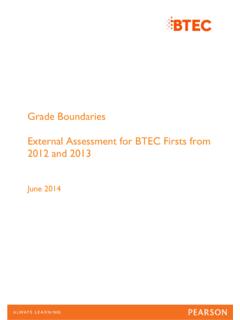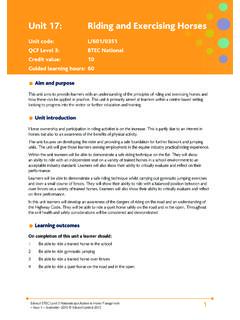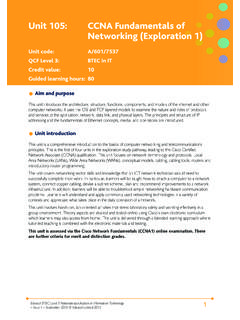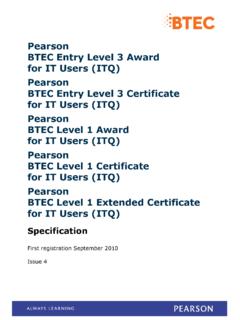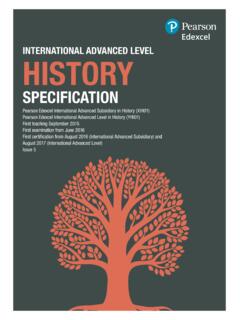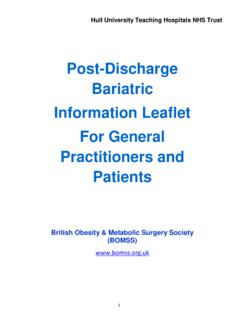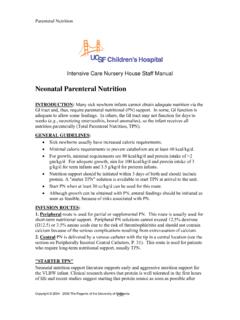Transcription of Unit 21: Nutrition for Health and Social Care - Edexcel
1 Edexcel BTEC Level 3 Nationals specification in Health and Social Care Issue 1 June 2010 Edexcel Limited 20101 unit 21: Nutrition for Health and Social CareUnit code: L/601/2407 QCF Level 3: BTEC NationalsCredit value: 10 Guided learning hours: 60 Aim and purposeThis unit aims to give learners an understanding of current thinking on nutritional Health particularly relating to users of Health and Social care services. Learners will then be able to apply this understanding and make recommendations to improve the nutritional Health of an introductionThis unit builds on learner understanding of the principles introduced in unit 5: Fundamentals of Anatomy and Physiology for Health and Social Care.
2 Improvements in the diet of individuals are increasingly being recognised as a significant factor in maintaining, or effecting improvements, in overall Health . It is therefore important that people working in the Health and Social care sectors, or those who are responsible for the wellbeing of others, have a good understanding of Nutrition and diet. This unit gives learners an understanding of Nutrition from a science-based perspective and of the role that food plays in Social contexts. The unit may also provide useful underpinning knowledge for the study of food hygiene and practical culinary will explore concepts of Nutrition using the language of nutritional science.
3 Different aspects of nutritional Health will be defined and routine ways of measuring this explored. Other aspects of nutritional data will involve describing the general principles on which nutritional requirements are determined in the UK and how information on the nutrient content of foods can be retrieved. Learners will also explore how the nutritional value of foods may be affected by food processing. The function and sources of the main nutrients will be investigated in relation to the contribution they make to the healthy physiological functioning of the body.
4 Particular attention is given to the chemical characteristics of nutrients and other features of the diet that are important in order to understand the scientific principles that underpin current government advice on nutritional Health and general wellbeing. The context surrounding food consumption in learners home countries will be considered through an exploration of the factors that influence the dietary intake of individuals. Learners will consider the consequences of some common disorders which give rise to specific dietary requirements.
5 The role of personal preferences, lifestyle and socio-cultural factors in determining what and how food is eaten will be addressed as well as economic factors. Social policy considerations, such as education and government initiatives aimed at improving nutritional Health are also , learners will carry out a quantitative investigation of the food intake of a chosen individual over a three-day period, analysing it in relation to the Health and lifestyle choices of the chosen individual. On completion of the unit , learners should be able to apply their understanding to promote healthy eating principles when supporting users of Health and Social care BTEC Level 3 Nationals specification in Health and Social Care Issue 1 June 2010 Edexcel Limited 20102 Learning outcomesOn completion of this unit a learner should.
6 1 Understand concepts of nutritional health2 Know the characteristics of nutrients3 Understand influences on dietary intake and nutritional health4 Be able to use dietary and other relevant information from an individual to make recommendations to improve nutritional BTEC Level 3 Nationals specification in Health and Social Care Issue 1 June 2010 Edexcel Limited 2010 unit content1 Understand concepts of nutritional healthConcepts: food, diet, meals and snacks, nutrientsNutritional Health : malnutrition, undernutrition, deficiency , overweight, obesityNutritional measures: nutritional and energy balance, growth charts, weight for height and gender, Body Mass Index (BMI); actual food intakes, recommended intakes: Dietary Reference Values, Reference Nutrient Intakes; nutrients per portion and per 100 g of foodDietary intake guidelines: Eatwell Plate, food groups, five-a-day.
7 Effect of food preparation/processing methodsCurrent nutritional issues: one of, eg food labelling, organic food, genetically modified foods, environmental aspects of food production, self-prescribed Health supplements, treatments for obesity, advertising food, global food inequalities2 Know the characteristics of nutrientsCharacteristics: dietary sources, function in body, changes in processing, eg heat, storage, freezingCarbohydrates: sugars, starch, non-starch polysaccharides; sugar substitutes, eg artificial sweeteners, sorbitolProteins: polypeptides, essential and non-essential amino acidsLipids: mono- and polyunsaturates; saturates, cis and trans fats; cholesterolVitamins: fat-soluble, eg A, D, E and K.
8 Water-soluble: B group, C Minerals: iron, calcium, others, eg magnesium, sodium, potassium, selenium, zincEnergy: dietary sources, as kilocalories and kilojoules, energy values for protein, fat, carbohydrate and alcoholOther diet-related consumption: water, dietary fibre, alcoholPhysiological context: nutrient functions explained using appropriate physiological terminology relevant to the body systems and metabolic processes, eg converted in liver to fatty acids stored in adipose tissue, absorption of calcium in small intestine Groups.
9 Young children, young people, adults, older people, pregnant women and breast feeding mothersEdexcel BTEC Level 3 Nationals specification in Health and Social Care Issue 1 June 2010 Edexcel Limited 201043 Understand influences on dietary intake and nutritional healthHealth factors: underlying Health condition resulting in specific nutrient needs, eg diabetes, coeliac disease, irritable bowel syndrome, lactose intolerance, food allergy; loss of ability to feed independently, eg from paralysis; loss of function, eg cognitive, digestiveDietary habits: influences, eg meal patterns, snacking, personal tastes, food availabilityLifestyle: influences, eg eating at home, Social eating and drinking, exercise/activity levels, occupation (active, sedentary), leisure pursuitsEconomic: influences, eg cost of food, access to shops.
10 Food supply, eg seasonal variationSocio-cultural: influences, eg beliefs, socialisation, food rituals, role of food in families and communitiesEducation: influences, eg public Health , Health education, food hygiene, marketing and labelling; role of Health professionals, eg dieticians, public Health nutritionists, doctors, nurses, carers, sports nutritionists, Health and fitness instructorsSocial policy: legislation, regulations and policies, eg Children Act 2004, Every Child Matters, Nutrition Standards for School Lunches and Other School Food 2006, other initiatives, eg Healthy Schools, National Minimum Standards for Care Home Catering4 Be able to use dietary and other relevant information from an individual to make recommendations to improve nutritional healthRecord of food intake: record over one three-day period, all food eaten including meals, snacks, drinks, confectionery, supplements.

